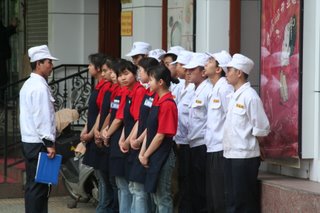Great Wall, Ill Winds and Character
 (Simati Section of the Great Wall.)
(Simati Section of the Great Wall.)From zero gravity, it is visible to the unassisted human eye. It is the only man made structure visible from outer space. Traversing more than 4,000 miles, the Great Wall in China has stood for more than 2,000 years. Standing on it and following its meandering line across ridgeline after ridgeline as far as the eye can see brings home the mangnitude of such a feat. Unfortunately, in the process, it costs tens of thousands of slaves their lives, at times working in freezing conditions hauling heavy stones up steep mountains.
From afar the Great Wall still looks pretty great as its outline is visible along the mountains tops for miles. Upon closer inspection, however, the Simatai section of the Wall where I visited was dilapidated and even closed off in some hazardous sections. At the tip of many former visitors, I left Beijing for the Wall at 5 a.m., getting snarled in some nasty traffic delaying my arrival until just after 8 a.m. when the ticketing office opened. First to arrive, I hurriedly began walking to the top, eager to beat the daytime crowds. After ten minutes, with no breakfast fuel in the tank, I began to tire. The ascent was not on treacherous ground or in poor temperatures, in fact it was a beautiful day, but it was steep. Huffing and puffing my way to the top, I imagined what it must have been like for the slaves involuntarily summoned to work in the heat of the hot summer days, hauling heavy stones behind them.
Reaching the top I was rewarded with spectacular 360 degree views around the Wall. It was afterall, a strategic defense point for the Emperor's army. No one else was on the wall so I spent a few moments taking it all in, using my mind's eye to restore the deteriorated portions to their former glory.
There are other areas of the wall open to visitors as well, and I hear they have been restored, but traveling the extra distance to the Simatai section was worth the effort. Sometimes, it's nice to see some of history untouched by modern reconstruction, other times it is a necessity. And with Olympic fever taking Beijing by storm, many parts of the city are getting an overhaul.
Unfortunately, what needs an overhaul in Beijing is not really being addressed on the critical scale that is required. Like the Great Wall, the environment in and around Beijing is severly degraded, only in the environment's case, the degradation has taken place in twenty years, since China's own Industrial Revolution. Beijing residents are paying a big price. On warmer days, the air is a thick gray haze, instinctively choking your throat as your eyes strain to see a full city block. For cities all over China this is a familiar scene. Known to be home to the most polluted city in the world, China is writing checks against Mother Nature that it can't cash.
The impact from its disregard for environmental harm is no longer relegated to its borders. Air from China is being found in tradewinds across the globe, including over the US. Minimal pressure has been exerted to effect real change as mass production facilities are quick to keep Wal Mart and Target shelves stocked with cheap imported goods. In a short time, no doubt the human health factor will catch up, if it hasn't already. While it is hard to get accurate details from the Chinese government, current numbers show there are 300,000 to 500,000 deaths each year attributed to pollution.
In all fairness, China is not alone in its poor global stewardship. Europe and the US were first to tax the planet's resources and natural air filter (rain forests) during their own Industrial Revolutions. And with President Bush's withdrawal from the Kyoto Protocol, China has little incentive to alter its behavior. All of it boils down to big economics. There is a lot of money at stake for a few at the top who stand to bring home big salaries from larger corporate profits. There is little difference between China and the US on that point. But who really picks up the price tag? You, me and the 6.6 billion other people on this third rock from the sun. And we are not going to get a second planet anytime soon. Once the sale is over, it's over for good.
Returning home, each time I hear about the Bush administration's attempts to repeal portions of the Clean Air Act, I will remember my tour of Beijing and washing my hair at the end of the day, only to see black water go down the drain. Clean air and water are something I take for granted at home, but the next time a politician moves to weaken environmental legislation protecting our resources, I'm going to buy him/her a one-way ticket to Beijing. They can buy their own bottled water because they are going to need it.
Character
OK, so enough ranting about the environment. What else do I take away from my trip to China? The American character is truly unique and special. A self-serving statement to be sure, but I lend support to my observation. I wrote about it briefly from India and I've witnessed it again in China, the "can do" attitude of the American character. China has a thriving manufacturing base, turning out millions of "things" one after the other. The Chinese people are a powerful world labor force with a deep connection to their history and a sense of national pride. Their differences from the West are immediately apparent, but their similarities are more striking and surprising.
 (A common scene around cities in China as workers stand at attention before starting their shifts.)
(A common scene around cities in China as workers stand at attention before starting their shifts.)They want peace, love and freedom like most. They are passionate about music, movies, fashion, Pizza Hut, KFC and spending time with family and friends.
 And I get the sense that the new twenty-something and younger generations will eventually bring about a gradual change in the government, much like what happened when a younger Gorbachev took the helm in the former Soviet Union. For their sake and happiness, I hope they get what they are looking for because only they can make it happen. It is not a path without resistance.
And I get the sense that the new twenty-something and younger generations will eventually bring about a gradual change in the government, much like what happened when a younger Gorbachev took the helm in the former Soviet Union. For their sake and happiness, I hope they get what they are looking for because only they can make it happen. It is not a path without resistance.Why are the Chinese so crazy about everything Americana? In my estimation, it is due to the magnetic draw of the American character. Many Chinese with whom I spoke thought I was crazy within ten minutes of meeting me (perhaps they are a good judge of character?). Assuming they are not, what did they find so crazy? It was my uninhibited nature to say or do whatever I was thinking or feeling. Few at home would have taken note, but in China, there is a tendency toward more of a group mentality. There are fewer filters through which Americans show their character (sometimes to our demise).
Generally as a culture, Americans are gregarious, open hearted and expressive, at least compared to the Chinese culture. Freedom from the time of birth leaves the reigns of expression loose and free to develop more naturally. That is not the case for many Chinese citizens. And the bland city streets, mechanical architecture and willingness to copy anything from abroad reflect the absence of creativity.
Americana is almost an intangible, but it's effects are apparent worldwide. Perhaps our last export, it produces music, movies and fashion adopted across the globe. Americana is the fruit borne of creativity from a free mind. Once again, my travels have reminded me that while in God's eyes all people are created equally, not all are treated equally here on earth.



<< Home